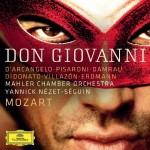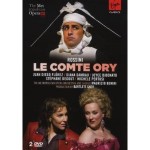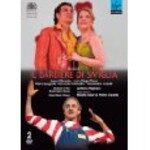

Reviewing performances—live or recorded—by mezzo Joyce DiDonato is becoming repetitive. You wait for a flaw—an aspirated run, a note out of tune, a rote performance,

I suspect that a better-cast Don Giovanni than this one would be hard to find nowadays. With ideal or near-ideal singers in six of the

First seen in 1828 at the Paris Opera, Le Comte Ory was Rossini’s penultimate opera and his last comedy. Six numbers were “borrowed” from Il

The CD’s title and its “Victor/Victoria” cover tells us a lot about this almost 81-minute recital, but not everything. Seeing as how Joyce DiDonato is

This performance, recorded in July, 2009 at Covent Garden, has become known as the Barbiere in which Joyce DiDonato sang from a wheelchair, having broken

Rossini’s La Cenerentola has not wanted for fine recordings; performances with Berganza, Bartoli, Baltsa, Larmore (and even Simionato), and others have appeared on CD, and

Joyce DiDonato becomes more interesting and more of a complete artist with each performance and recording. Even though we are living in a time of

The early-’60s Joan Sutherland/Decca recording of this opera–despite a large orchestra, cuts, Sutherland-without-consonants and at times sounding morose, with a showy aria given to Alcina

Although the whole performance is top-notch, the main reason for owning this Cenerentola is the warm, delightfully human, and stunningly sung Cinderella of Joyce DiDonato.

What have we here? An American opera, less than two hours long, that uses several musical idioms and styles (as well as leitmotifs) but never
![]()
